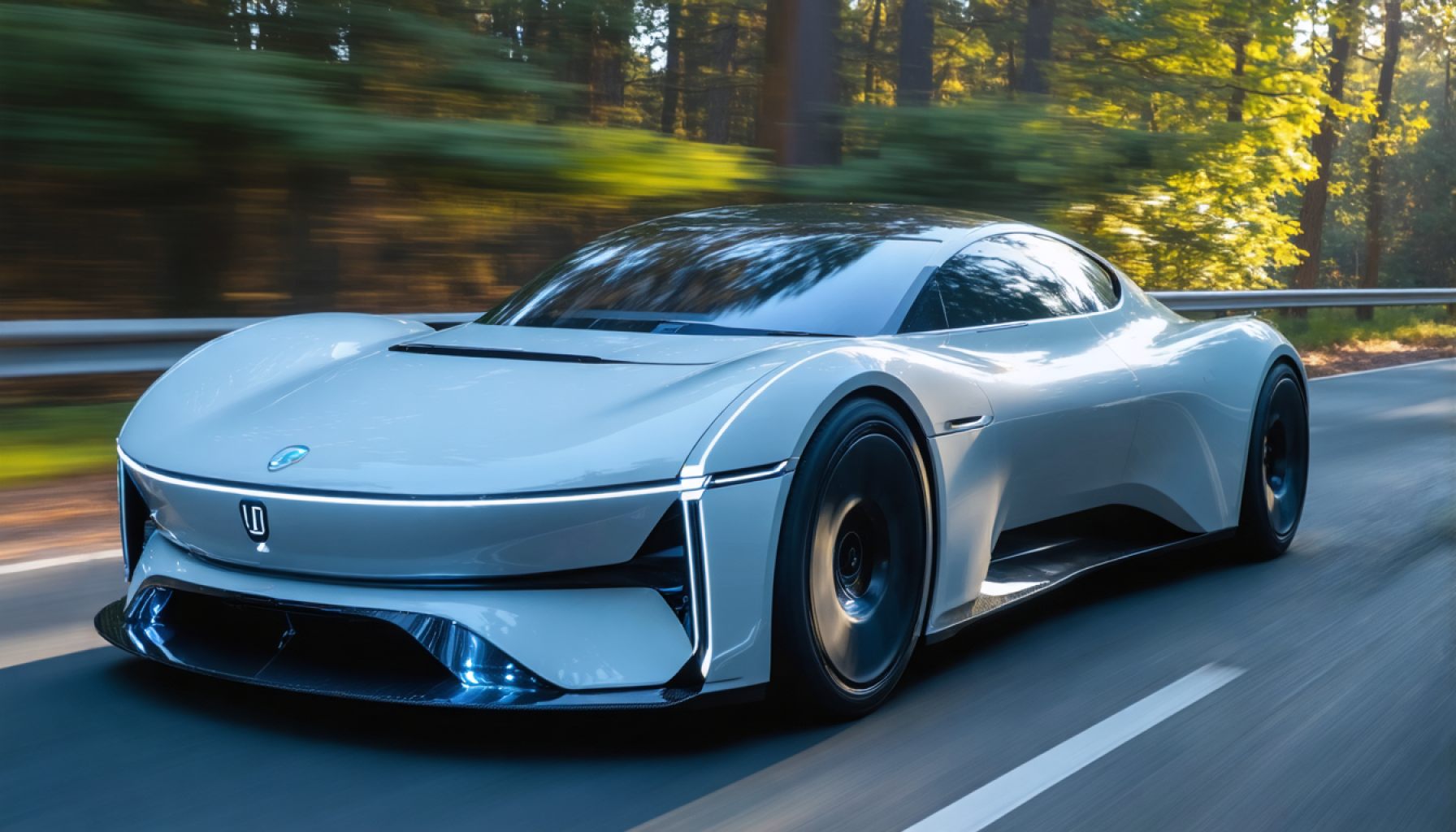- Lucid Group’s shares dropped by 3.3%, amid broader market fluctuations, reflecting economic uncertainties.
- The U.S. economy contracted by 0.3% in Q1 2025, signaling potential recession fears and affecting the electric vehicle market.
- President Trump’s tariffs are exacerbating trade tensions, further unsettling economic conditions.
- Consumer spending shows instability, impacting demand for luxury products like Lucid’s $70,000 entry-level model.
- Lucid faces financial challenges with substantial negative cash flow despite increasing sales and the chance to gain Tesla’s market share.
- Amidst obstacles, Lucid has opportunities to solidify its position in the luxury EV market as competitors face their own issues.
- Investors are closely watching Lucid’s ability to manage economic pressures and remain afloat in the competitive EV industry.
Amidst the thundering chaos of Wall Street, a sleek figure attempts to glide unnoticed—a Lucid electric vehicle, the embodiment of opulence on wheels, striving to maintain its momentum as economic winds blow fiercely against it. On Wednesday, shares of Lucid Group took a nosedive, the stock skidding 3.3% by midday, following a downward trend that reflected broader market jitters. The S&P 500’s and Nasdaq Composite’s simultaneous dips added a chorus of uncertainty echoing throughout the financial realm.
Lucid, the pioneering maker of luxury electric vehicles, finds itself navigating a turbulent economic landscape. Recent revelations of the U.S. economy contracting by 0.3% in the first quarter of 2025—a stark contrast to prior growth expectations—have intensified fears of a looming recession. President Donald Trump’s tariffs loom large, casting shadows over trade dynamics and further unsettling the economic climate. The initial GDP decline since 2022 paints a sobering picture; what had been anticipated as growth now appears as the first signs of economic contraction.
The situation grows even muddier when contrasting reports on consumer spending are considered—an erratic dance between restraint and indulgence. Yet, as uncertainty looms, the typical pattern emerges: frugal consumers often tighten their grasp on wallets, shunning high-ticket items in favor of frugal choices. For Lucid, with its entry-level model commanding a hefty $70,000 price tag, the challenge intensifies.
Lucid’s narrative veers towards a precarious crossroads. Despite a promising uptick in sales and the opportunity to snag market share from Tesla, currently embroiled in its own set of challenges, Lucid’s financial footing remains tenuous. The company has not yet carved a pathway to profitability, burdened by significant negative cash flow.
While the road ahead seems lined with obstacles, these turbulent times also hint at opportunities. In a world where Tesla battles its own tides, Lucid stands positioned at a gateway—poised to seize the moment or falter under the weight of economic pressures.
Investors and consumers alike must wait with bated breath as the luxury EV maker maneuvers through these stormy waters. The question lingers: will Lucid find a steady grip on this slippery track, or is it destined to spin out before it truly revs into the future? As the clouds gather, the vehicle that stands for luxury might just turn out to be the one to front-run the winds of change—or at the very least, hope to ride them to clearer skies.
Lucid Motors: Navigating Uncertainty and Seizing Opportunities in the Luxury EV Market
Overview of Lucid Motors’ Current Market Position
Lucid Motors, known for its luxurious electric vehicles (EVs), is currently facing significant challenges amidst economic turbulence. Despite recent advancements in sales and opportunities to capture market share from Tesla, the company’s financial situation is demanding, with profitability still out of reach.
Economic Factors Impacting Lucid Motors
1. Economic Contraction and Consumer Spending: The U.S. economy’s unexpected 0.3% contraction in early 2025 raises fears of a recession. Historically, economic downturns lead consumers to prioritize essential spending, which can hinder sales of high-priced items like Lucid’s luxury EVs. The $70,000 starting price for Lucid’s entry-level model may deter potential buyers in uncertain economic times.
2. Tariffs and Trade Dynamics: Tariffs imposed under President Donald Trump continue to affect trade costs, complicating the financial landscape for automotive manufacturers like Lucid. These tariffs can increase production costs, impacting profitability and pricing strategies.
Industry Trends and Predictions
– EV Market Growth: Despite economic challenges, the demand for electric vehicles is expected to grow, driven by increasing environmental awareness and government incentives for sustainable energy solutions. Lucid Motors, with its focus on luxury and performance, could tap into niche markets looking for high-end, eco-friendly vehicles.
– Competition and Innovation: As the EV market grows, competition intensifies. Lucid must continue to innovate, improving battery technology and expanding its vehicle lineup to attract diverse customer segments. Collaborations with technology firms could further enhance their competitive edge.
Opportunities and Challenges
Opportunities:
– Tesla’s Challenges: Tesla, a dominant player in the EV market, faces its own set of challenges, including production delays and quality concerns. Lucid could capitalize on these issues, capturing disenchanted Tesla customers looking for reliable and luxurious alternatives.
– Technological Advancements: Lucid’s investment in research and development positions it to lead technological innovations in battery efficiency and autonomous driving features, appealing to tech-savvy consumers.
Challenges:
– Negative Cash Flow: Lucid’s struggle with negative cash flow is a significant hurdle. The company must manage its finances carefully, possibly looking for strategic investors or partnerships to bolster its financial base.
– Market Perception: Lucid’s luxury branding could be a double-edged sword during economic slowdowns when consumers lean toward more budget-friendly options.
How Investors and Consumers Should Approach Lucid
– Investors: Monitor Lucid’s financial health, innovation pipeline, and market expansion strategies. While there’s potential for growth, the risks also loom large. Diversifying EV investments could mitigate exposure to Lucid’s volatility.
– Consumers: For those intrigued by the luxury EV market, watching for discounts or financing plans might present opportunities to own a Lucid vehicle as the company navigates through economic challenges.
Quick Tips for Lucid’s Success
– Enhance Financial Strategies: Seek innovative funding, explore cost-saving measures in production, and perhaps tap into financial partnerships to mitigate cash flow issues.
– Broaden Market Appeal: Expand marketing strategies to include eco-conscious consumers who value sustainability over luxury, potentially introducing more affordable models.
– Strengthen Brand Identity: Promote Lucid’s unique selling propositions, such as superior technology and luxurious experience, to maintain its distinct market position.
Conclusion
As Lucid Motors maneuvers through economic headwinds, its ability to adapt, innovate, and attract consumers will be critical. The company stands at a pivotal point, with the potential to rise above challenges or succumb to them. Investors and consumers should keep a close eye on Lucid’s strategic moves in this dynamic market.
For more insights into the automotive market and luxury EV trends, visit Lucid Motors.
 North Las Vegas & Enterprise Real Estate: Market Expansion, Trends, and Long-Term Projections
North Las Vegas & Enterprise Real Estate: Market Expansion, Trends, and Long-Term Projections  Blue Origin’s Bold Comeback: “Never Tell Me The Odds” Booster to Challenge SpaceX With August Launch
Blue Origin’s Bold Comeback: “Never Tell Me The Odds” Booster to Challenge SpaceX With August Launch  Billion-Euro Bet: UK Supercharges Global Race for Limitless Fusion Energy with Marvel Fusion Deal
Billion-Euro Bet: UK Supercharges Global Race for Limitless Fusion Energy with Marvel Fusion Deal  Dell’s Bold Move: New India Head, Surging AI Partnerships, and a Stock Price Rocketing 24%—What’s Next for This Tech Giant?
Dell’s Bold Move: New India Head, Surging AI Partnerships, and a Stock Price Rocketing 24%—What’s Next for This Tech Giant?  Lucid Group’s Bold Boardroom Shakeup: Is a Turnaround Finally Coming for This EV Underdog?
Lucid Group’s Bold Boardroom Shakeup: Is a Turnaround Finally Coming for This EV Underdog?  JWST’s Largest Cosmic Map Ever Stuns Astronomers: See Nearly 800,000 Ancient Galaxies in Unprecedented Detail
JWST’s Largest Cosmic Map Ever Stuns Astronomers: See Nearly 800,000 Ancient Galaxies in Unprecedented Detail  Russia’s Air Power Shaken: Shocking Satellite Images Reveal Scale of Ukraine’s Latest Drone Strike
Russia’s Air Power Shaken: Shocking Satellite Images Reveal Scale of Ukraine’s Latest Drone Strike  XRP Skyrockets: Wall Street and Asia Rush to Make Ripple Token the Next Big Treasury Asset
XRP Skyrockets: Wall Street and Asia Rush to Make Ripple Token the Next Big Treasury Asset  Spatial Transcriptomics Analysis Platforms Market 2025: Rapid AI Integration Drives 18% CAGR Through 2030
Spatial Transcriptomics Analysis Platforms Market 2025: Rapid AI Integration Drives 18% CAGR Through 2030 